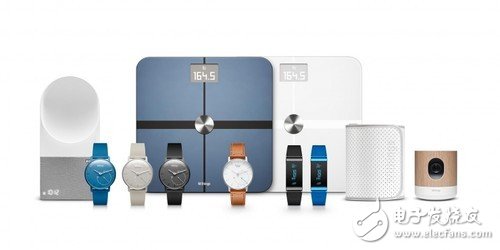Nokia's role as the "world's largest mobile phone manufacturer" has become a thing of the past, but the company is not ready to exit the historical arena of technology products. To build a health technology business, the company today announced the acquisition of Withings, a manufacturer of health products such as smart watches, smart scales and smart monitors. Withings is based in France and Nokia is based in Finland, so the acquisition is in euros: 170 million euros, or more than 190 million US dollars (about 1.24 billion yuan).
The acquisition is expected to be completed in the third quarter of this year and Withings will be part of Nokia Technology. This is a good deal: Withings has just received $34 million in investments from investors such as BIPFrance, Idinvest, Ventech and 360 Capital Partners.
At present, Nokia is still alive in the shadow of its past: once the world's largest mobile phone manufacturer, the company completed Microsoft's acquisition of its telephone business in 2014, currently only operating network equipment and research and development modules (the latter focuses on technology licensing and New products, such as the company's OZO virtual reality camera). Andings has been acclaimed for its high-value smart products, such as smart watches and the $100 smart thermometer that was astounding at CES in January this year. Seize these existing products - smart watches, motion monitoring, smart alarm clocks, etc., although they are small products, but their market advantage is still growing - Nokia has a series of future launch of its own wearable products and smart home products Options (and, companies already have networking technologies that can support such devices).

Withings a range of smart health products. Image source Withings.
It seems that the acquisition of Withings is not just about the health monitors, sphygmomanometers or thermometers that consumers will pay for, but the larger IoT industry – networking everything and running it in the cloud.
"We have been saying that digital health is a strategic area for Nokia. We are taking practical steps in this important market to seize the opportunity," Nokia President and CEO Rajeev Suri said in a statement. "With this acquisition, Nokia has strengthened its position in the Internet of Things and harnessed the power of brand trust, which is consistent with the company's vision: to expand the possibilities of people's lives in the connected world. This also makes us occupy a very large and considerable The center of the market, changing people's lives."
It is worth noting that this is the first time in recent years that Nokia has focused on the acquisition of consumer technology products: the previous few, including the acquisition of Alcatel-Lucent, was to build mobile back-end and connected services.
Although Nokia's mobile phone patents are not as eye-catching as they used to be, the company says Withings "will ensure that Nokia Technology continues the world-class patent layout."
Although the Internet of Things has lower profit margins than other digital services such as mobile phones, Nokia says health care is one of the biggest opportunities now, citing analysts' predictions of up to 37% CAGR (composite annual growth rate), making it “The fastest growing health sector in 2015-2020.â€
The acquisition also gives Nokia another ticket: people's life expectancy is getting longer and longer, and health is more and more concerned, but in many cases, we are actually not healthier than in the past, for example, weight problems have been affected for a long time. Sitting people, other diseases such as diabetes are widely affected by changes in our diet.
Withings was co-founded by Eric Carreel and Cedric Hutchings in 2008, and they seem to join Nokia. The company has 200 employees in France, the United States and Hong Kong.
“Since we started to operate Withings, enabling people to monitor their lifestyles and improve their personal health is what we love.†CEO Cedric Hutchings said, “We are very happy to join Nokia to help us achieve our vision and bring health to the world. more people."
For Withings, selling a company is a fantastic decision, especially to a European technology giant that is not a player in the activity monitoring/health technology industry. From a broader industry perspective, the future potential of IoT activity monitoring equipment may have to be questioned. Companies like Fitbit are growing, but growing slowly. Other companies, such as Jawbone, have witnessed a decline in the company's valuation, waiting for a breakthrough in the market.
The question now is whether Withings can capture the consumer concerns that have emerged in Nokia and whether Withings has the ability to be a leader in this industry. For Nokia, no matter what kind of abacus it is, you must remember the story of Cisco: As a leading manufacturer of computer network equipment, Cisco has been trying to launch its own consumer business for many years, until 2013 finally gave up. However, Nokia has had such a huge success in the consumer mobile phone market. With the help of Withings, it may be able to successfully return to the status of the king.
Connecting Terminals,Micro Connecting Terminal,Aluminum Connecting Terminals,Connecting Copper Terminal
Taixing Longyi Terminals Co.,Ltd. , https://www.txlyterminals.com
![<?echo $_SERVER['SERVER_NAME'];?>](/template/twentyseventeen/skin/images/header.jpg)